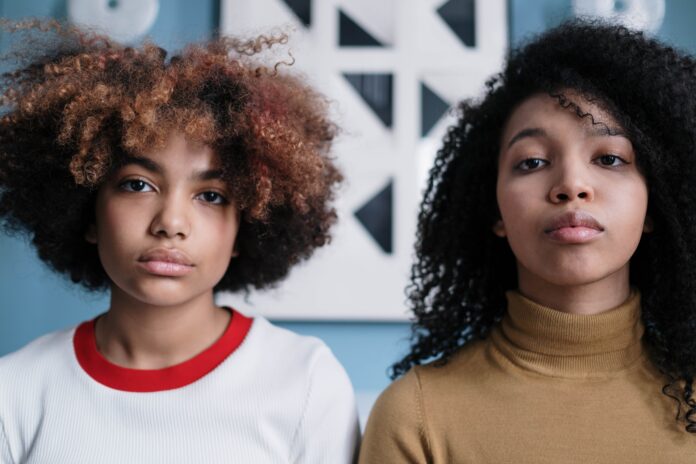
Black girls, who make up a bulk of child sex trafficking victims, often end up behind bars after surviving or attempting to escape abuse.
Girls like Cyntoia Brown-Long, who was sentenced to life in prison for killing a 43-year-old man who paid to have sex with her when she was 16. She was eventually granted clemency and released after serving 15 years.
“I just can’t help but feel an overwhelming gratitude and just a sense of awe with how everything played out,” she told NBC Nashville after her release in 2019.
Her case was unique: A-list celebrities like Kim Kardashian and Rihanna raised their voices with the public until she was freed.
But according to a new report released by Rights 4 Girls, a non-profit that pushes policy reform for marginalized girls, there are many other Black girls just like Brown-Long who are doing time after being sex trafficked and criminalized.
Black Girls Are Seen As Less Innocent
Black girls are overwhelmingly impacted by sex slavery, the report reveals. In 2019, Black youth were five times more likely than white youth to be arrested on charges of prostitution and commercial vice. Of the 214 arrests, 151 — or 70% — were girls, according to the U.S. Department of Justice.
This disparity has existed for over a decade.
A two-year study by the U.S. Department of Justice found that 40% of all sex trafficking victims between 2008 and 2010 were Black women.
Indira Henard, executive director of America’s oldest rape crisis center, the D.C. Rape Crisis Center, suggests these disparities aren’t by accident.
“When we talk about sex trafficking, we must remember that sex trafficking disproportionately impacts Black and brown girls, and, historically, the system has criminalized Black and brown girls instead of recognizing that they are victims,” she says.
We must ask ourselves what does it take to heal a young girl because what is at stake is that we are battling for the souls of these young girls.
INDIRA HENARD, EXECUTIVE DIRECTOR OF THE D.C. RAPE CRISIS CENTER
Systemic racism makes Black girls and women vulnerable by forcing them into poverty, the foster care system, and violent partnerships. These factors, as well as sexual violence, raise a person’s risk of being trafficked.
Traffickers prey on people seeking to feel safe, comfortable, and loved.
Ujima, the National Center on Violence Against Women in the Black Community, found that Black girls are being sexually violated at alarming rates.
In a national study conducted with high school students, 11% of Black girls reported having been raped. Overall, one-in-four face abuse before the age of 18.
Society’s devaluing of Black girls is rooted in the adultification of Black children. According to research by the Center on Poverty and Inequality, some adults believe Black girls need less nurturing and protection than white girls, and know more about adult topics and sex.
But more protection could save Black girls from bondage and its lingering health effects.
Victims Are Punished Instead of Protected
Despite extensive research from experts and organizations, Black girls are continuously pushed through the abuse-to-prison-pipeline. Rights 4 Girls found that girls are commonly criminalized for reporting abuse.
Sometimes, it looks like police officers filing false reporting charges against victims. Other times, it takes place in schools when administrators punish students who report sexual abuse and harassment.
Shiwali Patel, director for student survivors and senior counsel at the National Women’s Law Center, said discriminatory responses from schools are too common for girls of color.
“And especially Black girls, who — because of harmful race and sex stereotypes — are too often disbelieved, misperceived as the initial aggressor when they defend themselves against harassment, face minimization of their harm, or are blamed for their victimization,” she said in the report.
The types of physical and psychological abuse human trafficking victims experience can lead to depression, anxiety, post-traumatic stress disorder, and suicidal ideation.
The federal government has become increasingly vocal about the issue.
In 2015, the Obama administration acknowledged that status offenses — violations that often indicate underlying abuse — contribute to girls entering the carceral system.
And more recently, in 2022, President Biden signed the Violence Against Women Reauthorization Act, which includes provisions supporting survivors.
As organizations like Rights 4 Girls push for more policy change, Henard says there’s a lot on the line for girls who need saving.
“We must ask ourselves what does it take to heal a young girl because what is at stake is that we are battling for the souls of these young girls.”
Mental Illness and Sex Trafficking
Untreated mental illness increases a person’s risk of being trafficked, as they’re more susceptible to traffickers’ manipulative tactics. And trauma from being enslaved can cause conditions to worsen.
The types of physical and psychological abuse human trafficking victims experience can lead to depression, anxiety, post-traumatic stress disorder, and suicidal ideation.
In an early interview with a psychiatrist, Brown-Long recalled her experiences with “Cutthroat,” the man who trafficked her.
“He put guns up to me, told me to strip and stuff like that, get into bed with other people,” she said.
It’s also not uncommon for substance use disorders to play a role. Traffickers sometimes exploit individuals with a history of drug use, or give drugs to victims to maintain control.
Mental health care should be a top priority for survivors’ rehabilitation, according to researchers.
Additionally, Henard says programs for victims should keep girls out of cells.
“We also must look at reformative justice initiatives and programs that are not connected to state-sanctioned violence and are non-carceral,” she says. “Programs and services must have a direct response to racism and oppression.”



